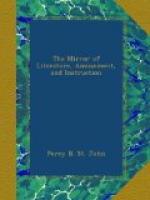The caaba, or great black stone, preserved by the Mahometans in the Temple of Mecca, had probably a celestial origin. It is said to have been brought from heaven by the angel Gabriel. Some astronomers imagine that these stones have been thrown from a lunar volcano. There is nothing, perhaps, philosophically inconsistent in this theory, for volcanic appearances have been seen in the moon; and a force such as our volcanoes exert would be sufficient to project fragments that might possibly arrive at the surface of the earth. But probability is certainly against it, and it seems more likely that they are fragments of comets. For those bodies, from their own nature, must be subject to chemical changes of a very violent nature; add to this, that from the smallness of their dimensions, a fragment projected from them with a very slight velocity would never return to the mass to which it originally belonged; but would traverse the celestial regions till it met with some planetary or other body sufficiently ponderous to attract it to itself.
We have numerous other instances of these phenomena, which are attested by many very credible witnesses, but I will not at present monopolize more of your valuable pages with this subject, though one of considerable interest; yet I may, perhaps, at some future period, if agreeable, send you a few rather more circumstantial and more interesting accounts than the above.
Near Sheffield.
J.M.C——D.
* * * * *
THE POET, CHATTERTON.
(To the Editor of the Mirror.)
Should the following notice of Chatterton, which I copy from a small handkerchief in my possession, be thought worthy of a place in the MIRROR, you will oblige me by inserting it. The handkerchief has been in my possession about twenty-five years, and was probably printed soon after the poet’s death; he is represented sitting at a table, writing, in a miserable apartment; behind him the bed turned up, &c.
SUFFOLK.
The Distressed Poet, or a true representation of the unfortunate Chatterton.
The painting from which the engraving was taken of the distressed poet, was the work of a friend of the unfortunate Chatterton. This friend drew him in the situation in which he is represented in this plate. Anxieties and cares had advanced his life, and given him an older look than was suited to his age. The sorry apartment portrayed in the print, the folded bed, the broken utensil below it, the bottle, the farthing candle, and the disorderly raiment of the bard, are not inventions of fancy. They were realities; and a satire upon an age and a nation of which generosity is doubtless a conspicuous characteristic. But poor Chatterton was born under a bad star: his passions were too impetuous, and in a distracted moment he deprived himself of an existence, which his genius, and the fostering care of the public would




